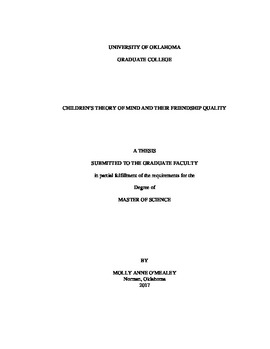| dc.description.abstract | Friendships are an important context of development during the elementary school years, buffering children against bullying and victimization and promoting positive social development in many ways. However, not all children develop stable, satisfying friendships. This study investigated the association between friendship quality and Theory of Mind in the early primary school years. Participants were first- and second-graders who took part in the study with a close friend. Both children completed a battery of first- and second-order ToM tasks and measures of friendship quality, loneliness, and social dissatisfaction. Results found that children with a close friend stronger in theory mind reported lower validation and caring, help and guidance, companionship and recreation, and intimate exchange in their friendships. A MANOVA showed significant differences between validation and caring, help and guidance, companionship and recreation, and intimate exchange based on gender. | en_US |
